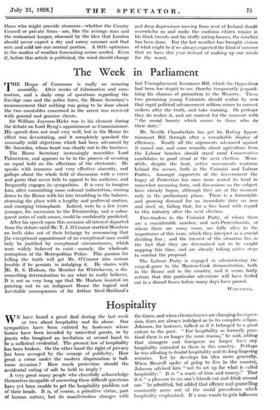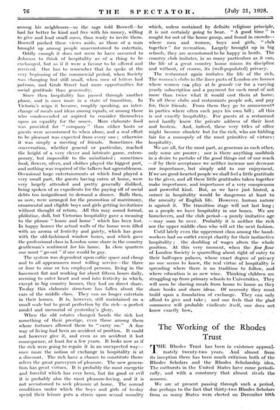Hospitality
WE have heard a great deal during the last week or two about hospitality and its abuse. Our sympathies have been enlisted by hostesses whose homes have been invaded by uninvited guests, or by LPuests who imagined an invitation at second hand to be a sufficient credential. The present law of hospitality has been broken. On the other hand the right of privacy has been avenged by the scourge of publicity. How great a crime under the modern dispensation is ball- room invasion ? How much protection should the accidental eating of salt be held to imply ?
A very great many people who cheerfully acknowledge themselves incapable of answering these difficult questions have yet been unable to get the hospitality problem out Of their heads. It is, of course, a primitive virtue, part of human nature, but its manifestation changes with the times, and when circumstances arc changing its expres- sion, fears are always indulged as to its complete eclipse. Johnson, for instance, talked as if it belonged to a great extent to the past. " For hospitality as formerly prac- tised there is no longer the same reason," he said, adding that strangers and foreigners no longer have any hospitality extended to them in this country. Perhaps he was alluding to feudal hospitality and its long-lingering remains. Yet he develops his idea more generally. When Boswell spoke of going to live in the country, Johnson advised him " not to set up for what is called hospitality." It is " a waste of time and money." That it is " a pleasure to see one's friends eat and drink around one " he admitted, but added that offence and quarrelling constantly arose out of the social precedence which hospitality emphasized. If a man wants to gain influence among his neighbours—so the sage told Boswell—he had far better be kind and free with his money, willing to give and lend small sums, than ready to invite them.
Boswell pushed these views aside, as those of a man brought up among people unaccustomed to entertain. Oddly enough it does not seem to have occurred to Johnson to think of hospitality as of a thing to be exchanged, but as if it were a favour to be offered and received. One has to remember that he spoke at the very beginning of the commercial period, when Society was changing but still small, when men of letters had patrons, and Grub Street had more opportunities for social gratitude than generosity.
Since then hospitality has passed through another phase, and is once more in a state of transition. In Victoria's reign it became, roughly speaking, an inter- change of meals and ideas among equals, or among those who condescended or aspired to consider themselves upon an equality for the nonce. More elaborate food was provided for " company " than either hosts or guests were accustomed to when alone, and a real effort to be pleasant was expected from every one ; otherwise it was simply a meeting of friends. Sometimes the conversation, whether general or particular, reached the height of a very clever and intricate game, extern-- porary, but impossible to the uninitiated ;- sometimes food; flowers, silver, and clothes played the biggest part, and nothing was required of the talkers but agreeableness..
Occasional large entertainments at which food played a very small part, the guests having eaten at home, were very largely attended and pretty generally disliked, being spoken of as expedients for the paying off of social debts too insignificant to demand a dinner. Balls then, as now, were arranged for the promotion of matrimony, ornamental and eligible boys and girls getting invitations without thought of return. All this may sound formal, philistine, dull, but Victorian hospitality gave a meaning to the phrase " house and home " which has been lost. In happy homes the actual walls of the house were filled with an aroma of festivity and gaiety, which has gone with the old-fashioned window boxes, and which gave the professional class in London some share in the country gentleman's sentiment for his home. In close quarters one must " go out " if one would be gay.
The system was dependent upon cubic space and cheap and to all appearances most willing service—the three or four to nine or ten employed persons, living in the basement flat and working for about fifteen hours daily, seeming to enter heart and soul into festivity in which, except in big country houses, they had no direct share. To-day this elaborate structure has .fallen about the ears of the middle class. They can no longer entertain in their homes. It is, however, still maintained on a • small scale but to great perfection by the rich—a perfect model and memorial of yesterday's glory.
When the old estates changed hands the rich lost something of their prestige, even those among them whose fortunes allowed them to " carry on." A fine way of living had been an accident of position. It could not however give it, and even as an accident it lost consequence, at least for a few years. It looks now as if the rich were going to regain it in an unexpected way— once more the notion of exchange in hospitality is at a discount. The rich have a chance to constitute them- selves the great purveyors of pleasure. The new genera- tion has great virtues. It is prohably the most energetic and forceful which has ever been, but for good or evil it. is probably also the most pleasure-loving, and it is not accustomed to seek pleasure at home. The nomad conditions. under which the boys and girls of to-day spend their leisure puts a strain upon sexual morality which, unless sustained by definite religious principle, it is not certainly going to bear. " A good time " is sought for out of the home group, and found in crowds— where men and women, boys and girls, " club together " for recreation. Largely brought up in big schools, they are accustomed to be happy in herds. The country club imitates, in as many particulars as it can, the life of a great country house minus its discipline and without, of course,. its (well-populated) privacy.
The restaurant again imitates the life of the rich. The women's clubs in the finer parts of London are houses where women cam play at la grande vie for a varying yearly subscription and a payment for each. meal of not more than twice what it would' cost them at home'. To all these clubs and restaurants people ask, and pay for, their friends. From them they go to amusements in parties where often each pays his own bill ; all this is not exactly hospitality. For guests at a restaurant need hardly know the private address of their host and hostess. And, indeed, these very titles of office might become obsolete but for the rich, who are bidding fair for a monopoly of the most primitive of virtues ; hospitality.
We are all, for the most part, as generous as each other, only some are poorer ; nor is there anything snobbish in a desire to partake of the good things out of our reach —if by their acceptance we neither increase nor decrease our importance, but simply add to our enjoyment. If we are good-hearted people we shall feel a little gratitude to the giver, and all these little gratitudes taken together make importance, and. importance of a very conspicuous and powerful kind. But, as we have just hinted, a corner in hospitality would be dangerous at least to the amenity of English life. However, human nature is against it. - The transition stage will not last long ; as a people we have hospitality in our bones. We are hornelovers, and the club period—a purely imitative age —may soon be over. Probably it is neither the rich nor the upper middle class who will set the next fashion.
Until lately even the uppermost class among the hand- workers had no outlet except charity for their instinctive hospitality ; the doubling of wages alters the whole position. At this very moment, when the fine finer of London Society is quarrelling about right of entry to their half-open palaces, whose exact degree of privacy no one seems to know, the real virtue of hospitality is spreading where there is no tradition to follow, and where education is as new wine. Thinking children are struggling up from primary schools to Universities. They will soon be sharing meals from house to house as they share books and share ideas. Of necessity they must build upon a foundation of exchange. They can only afford to - give and take ; and one feels that the glad commerce will probable vindicate itself, one does not know exactly how.





















































 Previous page
Previous page